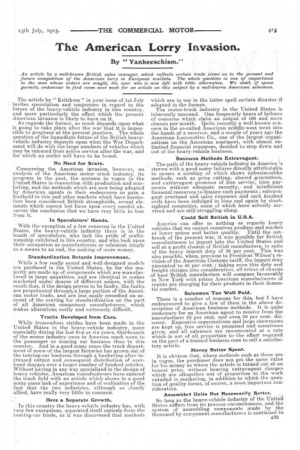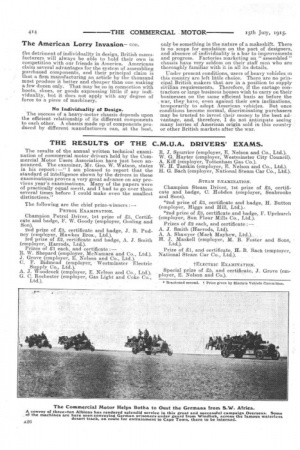The American Lorry Invasion.
Page 5

Page 6

If you've noticed an error in this article please click here to report it so we can fix it.
By " Yankee schism."
An article by a well-known British sales manager, which reflects certain trade .views • as to the present and future competition of the American lorry in European markets. The whole question is one of importance to the man whose orders are sought, the user who is now left with little alternative. We shall, if space permits, endeavour to find room next week for an article on this subject by a well-kno•vn American salesman.
The article by " Kritikuss " in your issue of 1st July invites speculation and conjecture in regard to the future of the heavy-vehicle industry in this country, and more particularly the effect which the present American invasion ie likely to have on it. As regards the former, so much depends upon what is going to take place after the war that it is impossible to prophesy at the present juncture. The whole question of the immediate future of the British heavyvehicle industry depends upon what the War Department will do with the large numbers of vehicles which may be released from active service after the war, and for which an outlet will have to be found.
No Need for Scare.
Concerning the American invasion, however, an analysis of the American motor truck industry, its progress in the past, the systems in vogue in the United States in connection with production and marketing, and the methods which are now being adopted by American agents in their endeavours to gain a foothold in this and other markets which have hereto : fore been considered British strongholds, reveal elements which cannot but force upon every careful observer the conclusion that we have very little to fear from it.
In Speculators' Hands.
With the exception of a few concerns in the United States, the heavy-vehicle industry there is in the hands of speculators, who lack the pride of craftsmanship exhibited in this country, and who look upon their occupation as manufacturers or salesmen simply as a means to an end, the making of more money.
Standardization Retards Improvement.
While a few really sound and well-designed models are produced in the United States, by far the majority are made up of components which are manufactured in large quantities, and are identical in makes marketed under dozens of different names, with the result that, if the design proves to be faulty, the faults • are perpetuated through,a large portion of the American motor trade, and are less easily remedied on account of the craving for standardization on the part of all American component manufacturers, which makes alterations costly and extremely difficult.
Trucks Developed from Cars.
White tremendous strides have been made in the United States in the heavy-vehicle industry, more especially during the last five or six years, this-lbranch of the motor industry owes in America much more to the passenger or touring ear business than in this country.. And in a good many cases the truck department of some of the largest factories has grown out of the touring-car business through a hankering after increased output and consequent distribution of averhead charges over a larger number of finished articles. Without having in any way specialized in the design of heavy vehicles. American manufacturers have entered the truck field with an article which shows in a good many cases lack of experience and of realization of the fact that the two industries, although so closely allied, have really very little in common.
Here a Separate Growth, In this country the heavy-vehicle industry has, with very few exceptions, separated itself entirely from the touring-car trade, as it was discovered that methods which are in use in the latter spell certain disaster-if adopted in the former. The motor-truck industry in the United States is inherently unsound. One frequently hears of failures of concerns which claim an output of 100 and more chassis per month. Quite recently a well-known cencern in the so-called American middle-west went into the hands of a receiver, and a couple of years ago the American Locomotive Co., one of the largest organizations on the American continent, with almost unlimited financial resources, decided to step down and out of the heavy-vehicle business.
Business Methods Extravagant.
• The path of the lheavy-vehicle industry in America :s strewn with a good many failures directly attributable to causes a scrutiny of which shoWs unbusinesslike methods, such as price cutting, absurd guarantees, and extravagant promises of free service, time payments without adequate security, and insufficient financial resources to finance such payments ; extravagant overhead and sales expenses and such kindred evils have been indulged in time and again by shortsighted companies, some of which have actually survived and are still struggling along.
Could Sell British in U.S.A.
America can offer us nothing as regards heavy vehicles that we cannot ourselves produce and market at lower prices and better quality. Until the outbreak of the present war, it was possible for British manufacturers to import into the United States and sell at a profit chassis of British manufacture, in spite of the heavy import duty of 30 per cent. This was also possible, when, previous to President Wilson's revision of the American Customs tariff, the in:iport duty amounted to 45 per cent.' taking even this duty and freight charges into consideration, all prices of chassis of best British manufacture will compare favourably in New York with prices American manufacturers of repute are charging for their products in their domestic market.
Salesmen Too Well Paid.
There is a number of reasons for this, but I have endeavoured to give a few of them in the above description of American business methods. It is quite customary for an American agent to receive from the manufacturer 25 per cent. and even 30 per cent. discount. Expensive organizations and large showrooms are kept up, free service is promised and sometimes given, and all salesmen are remunerated at a rate which is out of all proportion to :the effort required on the part of a trained business man to sell a satisfactory article. Money Better Spent.
It is obvious that, where methods such as these are in vogue, the purchaser does not get the same value for his money as where the article is turned out at an honest price, without bearing extravagant charges which are altogether out of 'proportion to the work entailed in marketing, in addition to which the clues; tion of quality forms, of course, a most important. consideration.
Assembled Units Not Necessarily better.
So long as the heavy-vehicle industry of the United States suffers from its present encumbrances, and the system of assembling components made by the thousand by component manufacturers is continued to the detriment of individuality in design, British manufacturers will always be able to hold their own in competition with our friends in America. Americans claim several advantages for the system of assembling purchased components, and their principal claim is that a firm manufacturing an article by the thousand must produce it better and cheaper than one making a few dozen only. That may be so in connection with boots, shoes, or goods expressing little if any individuality, but it does not apply with any degree of force to a piece of machinery.
No Individuality of Design.
The success of a heavy-motor chassis depends upon the efficient relationship of its different components to each other, A chassis made up of components produced by different manufacturers can, at the best, only be something in the nature of a makeshift. There is no scope for emulation on the part of designers, and absence of individuality is a bar to improvements and progress. Factories marketing an " assembled " chassis have very seldom on their staff men who are thoroughly familiar with it in all its details.
Under present conditions, users of heavy vehicles in this country are left little choice. There are no principal British makers that are in a position to supply civilian requirements. Therefore, if the cartage contractors or large business houses wish to carry on their businesses on the same efficient basis as before the war, they have, even against their own inclinations, temporarily to adopt American vehicles. But once conditions become normal, discriminating purchasers may be trusted to invest their money to the best advantage, and, therefore, I do not anticipate seeing many lorries of American origin sold in this country or other British markets after the war.




















